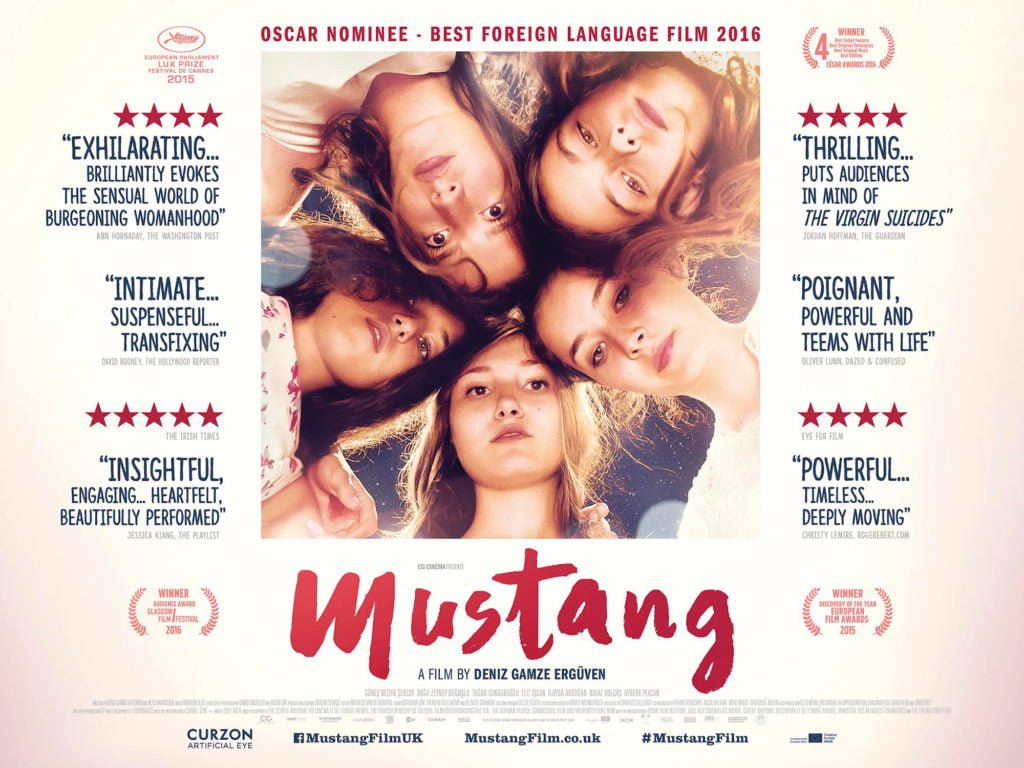Review: Mustang by Deniz Gamze Ergüven
May 23, 2016

If one is looking for a statement which neatly summarizes the current state of women’s rights in Turkey, it was delivered by the country’s president, Recep Tayyip Erdoğan, during his speech to mark this year’s International Women’s Day: ‘a woman is above all a mother’. Erdoğan’s AKP party has made proposals to limit birth control, caesarean sections and abortion rights; Erdoğan himself has branded birth control ‘treason to the country’ which seeks to ‘dry up our generations’. In this light, Deniz Gamze Ergüven’s feminist fable feels all the more subversive. Mustang has had a polarizing effect in Turkey, with her most vociferous critics branding the first-time director ‘an enemy of the nation’.
Mustang tells the story of five sisters – Lale (Günes Sensoy), Nur (Doga Zeynep Doguslu), Selma (Tugba Sunguroglu), Ece (Elit Işcan) and Sonay (Ilayda Akdogan). The sisters’ parents were killed ten years earlier in a car crash, and they live in a rural Black Sea town with their Grandmother (Nihal G. Koldas) and uncle, Erol (Ayberk Pekcan). It is the last day of school, and the sisters go to the beach with a group of boys; they play in the sea and are carried on the boys’ shoulders. This innocent idyll is shattered when the girls return home to discover that their actions have scandalised the village. Erol decides that the sisters have been given too much freedom and they are sequestered in the house, which is turned into a ‘wife factory’. But Lale, the youngest sister, refuses to accept her fate.
With its sun-bleached, dreamy ambience, the film to which Mustang has most commonly been compared is The Virgin Suicides (1999); but Ergüven draws equally from Greek mythology – Ergüven describes the sisters as ‘ a little monster of femininity with five heads’ – fairy tales and prison drama tropes; its premise has echoes of Dogtooth (2009) and The Castle of Purity (1973); while its blending of the prosaic and the uncanny calls to mind the unsettling effect of Bergman and Lynch. This effect is augmented by another sublime score from Warren Ellis, which stands alongside his work with Nick Cave on The Proposition (2005), The Road (2009) and Loin des Hommes (2015). Without melodrama or polemic, Ergüven and co-writer Alice Winocour have crafted a story which addresses the circumscribed hopes of Turkish girls while functioning on its own terms. Its contrivances work within the context of the heightened world it depicts; like the best fable, Mustang is interwoven with a very real sense of dread and bears its allegorical weight lightly.
Ergüven brings an empathic eye to her subjects; she captures the sisters’ burgeoning sexuality without ever sexualising them; this is not a work of sensuality, but a work about the crushing of sexual identity under the wheels of social conformity. Ergüven’s camera is instilled with a youthful restlessness which mirrors the sisters’ growing pique and defiance, and she coaxes emotionally rich and naturalistic performances from the whole cast. Though all of Ergüven’s young leads are exceptional, Sensoy is the standout, delivering a beguiling performance as the wilful Lele. Lele is the crux of the story, trapped in the netherworld between childhood and womanhood, and Sensoy handles the demands of the role with precocious ease. Koldas is quietly devastating as the emblematic woman struggling to bear the burden of social expectation, and Pekcan is a sterling antagonist; a symbol for the forces of reaction.
Like Ergüven’s fellow La Fémis graduate Céline Sciamma’s Girlhood (2014), what makes Mustang such an accomplished work is the ease with which it blends specificity with universality. Mustang tells a story which takes place in a particular and intricately rendered milieu, but its message is applicable to anyone whose freedoms are being curtailed by the forces of Puritanism and patriarchy. With ribald humour and a keen sense of irony, Ergüven skewers the hypocrisy and prurience which underscores so much of this onslaught, the fixation on sex which attends its prohibition. In a culture where women are forbidden from public displays of emotion, Mustang revels in the transgressive power of laughter. Equally poetic, playful and political, Mustang signals the emergence of a vibrant and vital voice in Ergüven. It is rare to see a debut film which is so decisively true to itself.




Comments